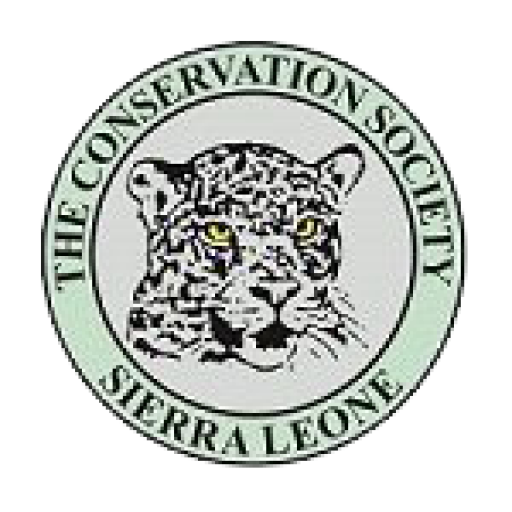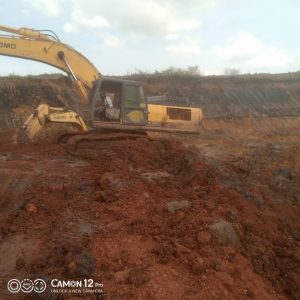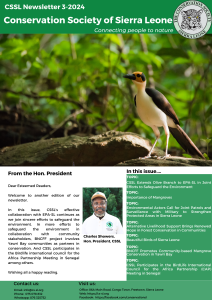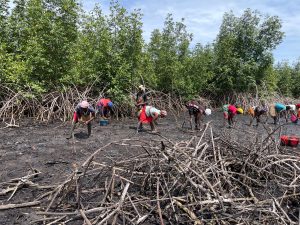Uncontrolled purchase and sale of land, building construction, logging, farming, stone mining, charcoal burning, etc. have caused massive deforestation and degradation to the Western Area Peninsula National Park (WAPNP). This has had tragic consequences for vulnerable people living in and around the forest.
On August 14th, 2017, following very heavy rainfall, twin disasters of mudslide and flooding struck some areas in and around the National Park. Hundreds of people were killed and many more lost their homes and possessions. This fatal and tragic incident has been linked to the extensive deforestation and degradation of the Forest. In order to forestall future environmental disasters, the Conservation Society of Sierra Leone (CSSL), through support from the Darwin Initiative/MAVA Foundation organized a two-day stakeholder conference on Land Use Planning in Freetown on 21st and 22nd February, 2019th. The conference brought together key stakeholders from relevant ministries, departments and agencies (MDAs), civil societies and other institutions to brainstorm and chart the way forward, and possibly develop afterwards, a land use plan for the WAPNP and its environs.
The event chairman, Israel Jigba, Permanent Secretary, Ministry of Lands, Housing and the Environment (MLHE), welcomed the participants and intimated that, Sierra Leone is a victim of environmental disasters. He made reference to the floods, mudslide and Ebola crisis and asserted that as a nation, there was poor management of the country’s resources and wise use of the environment. He revealed that the nation could not survive if there was continued misuse our lands, and underscored the importance of stakeholders coming together to formulate policies regarding the appropriate use of land. He further asserted that the two-day conference was aimed at suggesting ways with which man could comfortably co-exist with the environment. He encouraged all to participate actively to ensure the achievement of the activity’s set objectives.
In a view to trigger discussions among participants, a ten-minute skit was staged by Freetong Players International (a renown cultural/drama group in Freetown). The skit reflected and illuminated the perennial problems of land grabbing, encroachment on water catchment areas, sand mining, stone mining and the like. This satire hit at the heart of the problem and graphically demonstrated the behaviour of people in communities along the Western Area Peninsular (WAP).
The chairman commented that Freetown is replete with land grabbers and noted that, it was one of the key causes of wide scale deforestation and water scarcity. He told the gathering that the skit clearly demonstrated why stakeholders were there and urged all not to allow the previous calamities of Ebola, flooding and mudslide to repeat themselves.
Through the Land That We Love (LTWL) movement, a photo exhibition was presented by Tommy Garnet, Executive Director, Environmental Forum for Africa (EFA) to show a clear picture of the WAPF landscape since 1950s to date. Before the exhibition, Mr. Garnet revealed that the LTWL movement was born out of the aftermath of the August 14th 2017 mudslide in Freetown in which a lot of lives were lost. He noted that, all the nation’s calamities – Ebola, flooding, mudslide – were directly related to man’s activities on the land given to us by God. He told the gathering that LTWL seeks to do things differently: to raise awareness and create a difference. Furthermore, Mr. Garnet used the photo exhibition to tell a story about how Sierra Leone, since 1950 was bound to destruction because of anthropogenic factors. He urged all to come on board to rescue the country and revealed that, members of the movement had been very active in moving from place to place, showing their pictures across the country so that people could ask the difficult questions. He also informed the gathering that they were collecting signatures to present to His Excellency, President Julius Maada Bio in order to launch a campaign ‘Every Child Plants a Tree’. He concluded by calling on stakeholders to get on board and do something to help children plan their future better.
Mrs. Kamara who represented the National Protected Area Authority (NPAA) appealed to participants to preserve the environment for the good of all. She further called on all to treat nature not only as our child, but also our mother, and admonished the gathering to be mindful of angering nature. Mrs. Kamara added that man cannot live without the trees and other elements of nature and urged all present to work together collaboratively in order to save the environment.
Dr. Foday Jaward, the Head of Environment Protection Agency (EPA) also made a statement in which he expressed his sincere gratitude to the organizers for convening the conference. He commended Dr. Banya for founding CSSL and expressed the hope that the conference would succeed in developing a land use plan aimed at conserving the environment and saving Sierra Leone from further natural disasters. He alluded to the perennial water shortage in particularly the Western Area, low water quality of running streams and environmental disasters, and reminded all about the huge responsibility on everyone to protect the forest and provide food security. He further stated that his agency was in the process of establishing a court for environmental crimes and asserted that it everybody’s collective responsibility to conserve the forest and land resources. Additionally, he registered EPA’s commitment to collaborate with other ministries, department and agencies and declared that they should be ready to take bold decisions for the sustainable development of the environment.
Dr. Sama Banya, the founding father of CSSL, made a statement about the timeliness of the conference and underscored the scale of destruction on the environment. He lamented that if Pedro da Cintra were to be in Sierra Leone today, he would not call our country Serra Lyoa. “The challenge is for all of us as Sierra Leoneans to rewrite the wrongs for having destroyed God’s creation”, he appealed.
A staff from the Royal Society for the Protection of Birds (RSPB), Bruce Liggitt who happened to witness the conference, registered how pleased he was with the presentations and statements delivered. He asserted that it showed Sierra Leoneans’ good understanding of the prevailing problems and how uniquely they were positioned to solve them. He underlined RSPB’s commitment to support the stakeholders but asserted that, everything was in the hands of Sierra Leoneans themselves for it was the will and actions that would count.
Dr. Sheku Kamara, Executive Director of CSSL, expressed his delight regarding the enthusiasm of participants to bring out burning issues. He reported that the problems still persist and complained that human beings wish to do the same things all the time but expect things to change. He maintained that there was still something that stakeholders could do to salvage the situation. He underpinned the urgency of forming a partnership, adding that, one person or institution should neither be blamed nor be able to provide the solutions to it alone. Dr. Kamara added that, the conference was concerned with promoting and revitalizing the WAP and bringing together a group of like-minded individuals as a unified force, a sort of nucleus that could take off after the two days’ deliberations.
Various other speakers also made invaluable contributions on behalf of their respective institutions. They included representatives from the Office of National Security (ONS), Freetown City Council (FCC), Western Area Rural District Council (WARDC), the British High Commission, Parliamentary Oversight Committee on Lands & Environment and the Ministries of Agriculture & Forestry and Health & Sanitation, among others.
Delivering the keynote address, the Minister of Lands, Housing and the Environment, Dr. Denis Sandy, congratulated the organizers for convening the conference and commended Dr. Banya for his big heart and selfless desire to conserve the environment. He emphasised that, “land absolutely matters, regardless of where it is and that, under the New Direction, my ministry will continue to take bold steps to improve the face of Sierra Leone and put words into action”. He continued that, there was a whole network of people grabbing and selling land, but warned that he would stop at nothing to put a stop to that menace. He furthered that there is land for every Sierra Leonean, if only people were not so selfish as to claim ownership of 40 or even 100 acres of land. He briefed the gathering on the work that his ministry was doing, including repossession of 2,800 acres of land, the proactive measures taken at the Gloucester Saddle and Botanical Garden and driving the people out of Orugu, among others. Dr Sandy emphasised that, Sierra Leoneans should not allow the country to be classified always as disaster prone, and called on all to collaborate in order to do things right. He admonished all to be vigilant and threw light on the consequences of human activities on the environment.
A communiqué containing commitments of participants to protect the WAPNP and its environs was presented and signed by heads of key relevant institutions, which climaxed the first day of the conference.
One of the outcomes of the conference was to review a logframe that would form part of a project proposal aimed at attempting to tackle the perennial environmental problems in the WAPNP. The second day’s sessions were therefore, mainly focused on reviewing the logframe, with participants making their inputs through group work and plenary presentations. The various inputs and recommendations were catalogued into a separate document and annexed to the report and presented for review to CSSL’s strategic partners.



